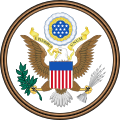California National Party Partido Nacional de California | |
|---|---|
 | |
| Abbreviation | CNP |
| Founded | 2015 |
| Headquarters | Sacramento, California |
| Membership (January 2022) | 413 [1] |
| Ideology | Californian nationalism Social democracy Environmentalism |
| Political position | Center-left |
| Colours | Yellow Blue |
| Seats in the U.S. Senate | 0 / 2 |
| Seats in the U.S. House | 0 / 52 |
| Statewide Executive Offices | 0 / 8 |
| Seats in the State Senate | 0 / 40 |
| Seats in the State Assembly | 0 / 80 |
| Website | |
| www | |
The California National Party (CNP; Spanish : Partido Nacional de California [2] ) is a progressive and secessionist political party in the United States. CNP operates within California and supports Californian nationalism. [3] [4] CNP formed in 2015.
Contents
- Membership
- History
- Ideology
- Election results
- Statewide elections
- Local elections
- See also
- References
- External links
CNP's name and purpose are partly inspired by the Scottish National Party, a social democratic, civic nationalist, center-left party that advocates independence for Scotland. [5] [3]
CNP was registered with the California Fair Political Practices Commission, California's equivalent of the Federal Election Commission, in 2019 [6] but not in 2021 [7] or 2023. [8]

